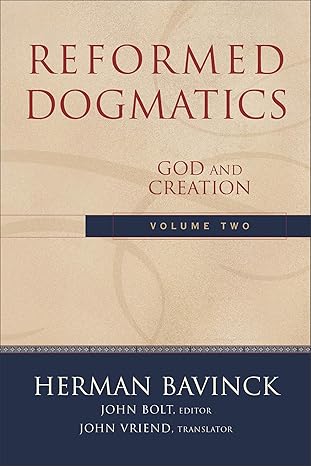A Brief Book Summary from Books At a Glance
by Steve West
Table of Contents
Part I – Knowing God
1 The Incomprehensibility of God
2 The Knowledge of God
Part II – The Living, Acting God
3 The Names of God
4 God’s Incommunicable Attributes
5 God’s Communicable Attributes
6 The Holy Trinity
Part III – God’s Will on Earth as it is in Heaven
7 The Divine Counsel
8 Creation
Part IV – Maker of Heaven and Earth
9 Heaven: The Spiritual World
10 Earth: The Material World
Part V – The Image of God
11 Human Origins
12 Human Nature
13 Human Destiny
Part VI – God’s Fatherly Care
14 Providence
Summary
*Editor’s Note: This book is divided into two book summaries. The first summarizes Parts I-II, and the second summarizes III-VI.
Part III: God’s Will on Earth as it is in Heaven
God’s decrees are worked out in time and space history, but they are grounded in his eternal counsel. God determines what will be and decrees its existence before it comes to pass in time. The acts of God take place in time, but they were determined by nothing more than the will and pleasure of God before time began. Election is not grounded in the creature, but in God alone. The relationship between God’s sovereign decrees and human moral agency and responsibility has been understood in a variety of ways. Against the Pelagian and semi-Pelagian views, Augustine argued that human nature was totally corrupted in the fall, and that the elect were chosen by God so that they could believe in him (rather than that they were chosen because they were foreseen to believe). Although God decrees all things, he does so asymmetrically, not bringing about evil the same way that he brings about good. Reprobation flows from strict justice, while election is rooted in God’s love and grace.
Although Pelagianism was condemned, the semi-Pelagian view took root in Roman Catholicism. Simple foreknowledge perspectives and middle knowledge assumed this libertarian view of agency. The Reformation recovered the Pauline and Augustinian understanding of predestination, but Lutheranism eventually departed from Luther’s own understanding at this point. In Reformed theology, predestination is treated as part of the doctrine of God rather than under anthropology or soteriology, because it is grounded completely in God’s will and pleasure, and it is to his glory. Inside of the Reformed community, debates have existed between supralapsarianism and infralapsarianism, but both positions can be fairly seen as belonging to the Reformed tradition. The former prefers an ideal, teleological approach, while the latter looks to a historical, causal order of the decrees. Scripture underdetermines this issue and so a simple appeal to Scripture cannot be conclusive for this debate. Neither position satisfies the fullness and riches of the biblical data, and both views contain truth. Supralapsarianism sees a higher cause of reprobation in the plan of God than the fact of human sin. Infralapsarianism is still attacked by Arminians and other libertarians. Over the course of time, Reformed churches moved away from a strong view of predestination and many embraced the Remonstrant position. The doctrine of predestination has often been confused with philosophical determinism or fatalism, and rejected on the basis of that misidentification. . . .
[To continue reading this summary, please see below....]The remainder of this article is premium content. Become a member to continue reading.
Already have an account? Sign In
